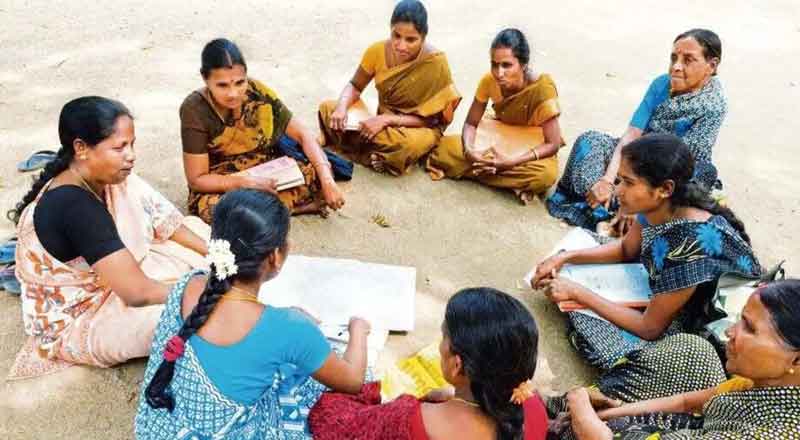The Government gives utmost priority to the safety, security and empowerment of women including rural women. The Government has adopted multi-pronged approach to address the issue of women on a life-cycle continuum basis for their educational, social, economic and political empowerment so that they become equal partners in fast paced and sustainable national development.
Through the 73rd amendment to the Constitution of 1/3rd seats in the Panchayati Raj Institutions (PRIs) have been reserved for women. However, today there are more than 14.50 lakh Elected Women Representatives (EWRs) in PRIs, which is approximately 46% of the total elected representatives. The Government is providing training to the EWRs from time to time to build on their capacity.
Besides, in the past few years, a number of initiatives have been taken for holistic development and empowerment of women. The Government of India implements various schemes / programmes for welfare of women/ girls in which community participation plays an important role. Under National Rural Livelihoods Mission (NRLM), nearly 9.00 crore women are connected with around 83.5 lakh women’s self-help groups that are transforming rural socio-economic landscape in several innovative and socially and ecologically responsible ways, also availing governmental support including through collateral free loans. The Mahatma Gandhi National Rural Employment Guarantee Act, 2005 (MGNREGA) mandates that at least one third of the jobs generated under the scheme (MGNREGS) should be given to women.
National Agriculture Market or e-NAM, an online trading platform for agricultural commodities is helping women overcome or compensate the barriers they face in accessing markets. National Cooperative Development Corporation (NCDC) is playing a significant role to uplift women cooperatives as large number of women are engaged and involved in cooperatives dealing with activities related to food grain processing, plantation crops, oilseeds processing, fisheries, dairy & livestock, spinning mills, handloom and power loom weaving, Integrated Cooperative Development Projects, etc. Other schemes include Beti Bachao Beti Padhao (BBBP), Samagra Shiksha, Babu Jagjivan Ram Chhatrawas Yojna, Swacch Vidyalaya Mission, Swachchh Bharat Mission, etc. In order to enhance the employability of female workers, the Government is providing training to them through a network of Women Industrial Training institutes, National Vocational Training Institutes and Regional Vocational Training Institutes. To ensure economic independence of women through skill development and vocational training, the Government has also introduced Skill India Mission.
The Anganwadi Services under Mission Poshan 2.0 is a universal scheme under which pregnant women and lactating mothers are eligible for the services including the Supplementary Nutrition Programme (SNP). For partial compensation of wages and for promoting health seeking behavior among pregnant women and lactating mothers, Government has implemented Pradhan Mantri Matru Vandana Yojana (PMMVY) which aims to promote appropriate practice, care and institutional service utilization during pregnancy, delivery and lactation by providing cash incentives in Direct Benefit Transfer (DBT) mode to pregnant and lactating mothers. Benefits have been extended to over 3.20 crore women through this scheme.
Construction of over 11.00 crore toilets under ‘Swachchh Bharat Mission’, clean cooking gas connections to nearly 9.58 crore women below poverty line under ‘UjjawalaYojana’ and connecting over 12.59 crores out of 19.46 crores rural household with tap drinking water connections under ‘Jal Jeevan Mission’ have transformed the lives of women by reducing the drudgery and care burden. Prime Minister’s Rural Digital Literacy Campaign (Pradhan Mantri Gramin Digital Sakasharta Abhiyan (PMGDISHA) that seeks to make 6 crore persons digitally literate, by covering one member from every eligible household. Over 53% of the beneficiaries under PMGDISHA are women.
The Ministry of Women and Child Development implements ‘Mission Shakti’, an Integrated Women Empowerment Programme, as Umbrella Scheme for the Safety, Security and Empowerment of Women. The ‘Mission Shakti’ has two sub-schemes namely “Sambal” for safety and security of women and “Samarthya” for empowerment of women. Under ‘Samarthya’ sub- scheme, a new component i.e., Hub for Empowerment of Women (HEW) has been included with the aim to facilitate inter-sectoral convergence of schemes and programs meant for women at the Central, State/ UT and District levels for creating an environment in which women are able to realize their full potential. The support under the HEW provides for guiding, linking and hand holding women to various institutional and schematic set ups for their empowerment and development including access to healthcare, quality education, career and vocational counselling/ training, financial inclusion, entrepreneurship, backward and forward linkages, health and safety for workers, social security and digital literacy at districts/ Blocks/ Gram Panchayats level across the country including Karnataka and Gujarat.
This information was given by the Union Minister for Women & Child Development, Smt. Smriti Zubin Irani in a written reply in the Lok Sabha today.




